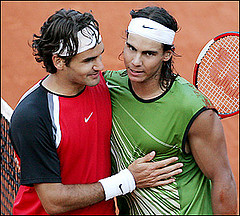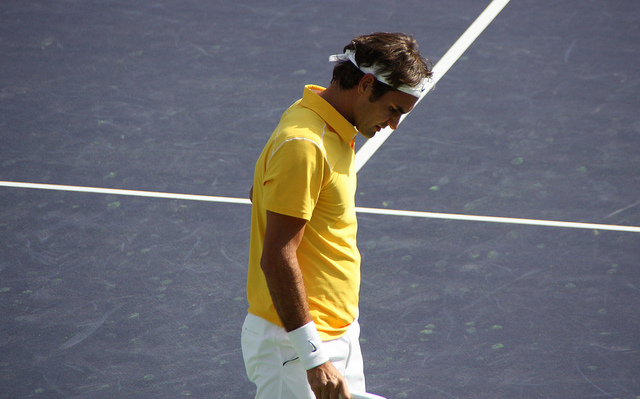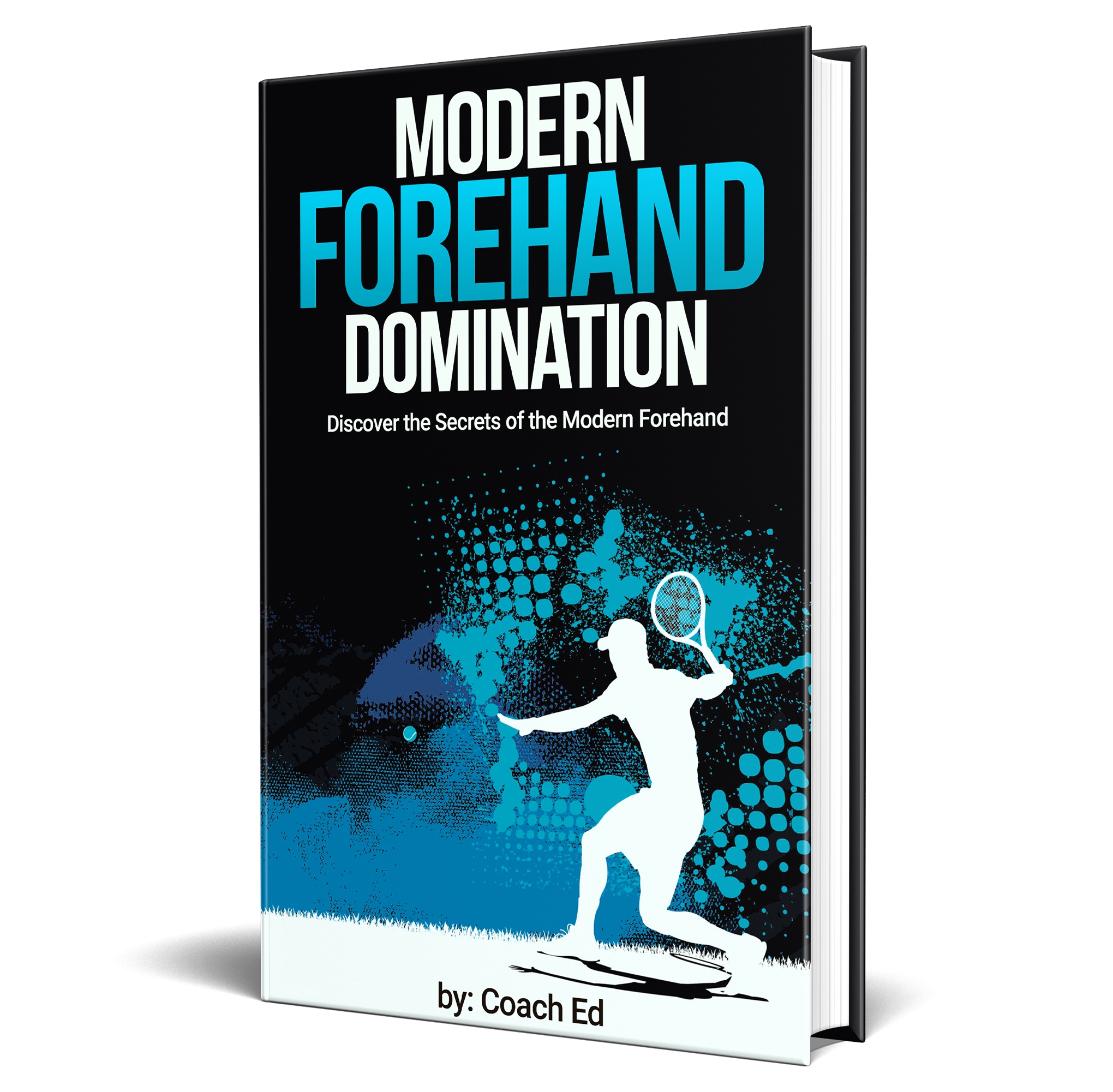In order to develop tennis mental toughness, player’s must be mentally strong and capable to win the inner game inside every tennis match. The biggest battle in some cases is not the opponent, but rather a player’s own mind. Therefore, the development of mental toughness in tennis is not only a necessity, but perhaps an essential.
Mental toughness in tennis is not a genetics thing. Players are not born with the natural ability to be mentally tough in tennis. Most of the time, the qualities that make up a winning tennis player’s mind is the behaviors, attitudes and mindset of the individual player. Confidence comes not just from playing tennis, but a routine refinement of one’s mental skills in tennis.
Humans have the distinct ability to determine a person’s tennis mental toughness the second the opponent walks into the court. A player with a strong mental tennis game will easily show his or her traits subconsciously.
In this article, we will discuss the factors of tennis mental toughness and how you too can develop the mindset of tennis mental toughness
Learning Tennis Mental Toughness




While there are some beginners who get the hang of it more quickly than others, they all frequently fail to do this at first; yet you can immediately see the kind of player they’ll eventually turn out to be, in terms of their potential for developing their mental toughness in tennis. It can be seen by how they react when they fail to get the ball over the net.
Do they laugh? They may laugh at first, but how do they get as more and more shots go awry? Do they get frustrated or downright angry? Or maybe they just get serious, try to listen more closely to the instructions and make the requisite adjustments?
Coincidentally, it is at this point – at the very beginning – that mental toughness in tennis can and should be taught. Like any new skill, it takes a certain amount of time before a certain degree of proficiency can be attained in tennis. Because there will expectedly be a lot of mistakes early on, beginners need to be taught how to deal with these errors. This is all part of learning.
Learning Roger Federer’s Mental Toughness in Tennis
Unfortunately, many people want to be Roger Federer right away and hit the ball as sweetly as he does. They see the pros make it all look so easy and hear the commentators gasp at the unforced error that just misses the line.
This all reinforces upon their minds that mistakes are failures and are not acceptable. But they are part of the process! It would be wrong for a teacher to say that making the same mistake over and over again is a good thing, and that is why mistakes should be corrected as soon as possible. But it is also not the worst thing ever. Rather, it should be accepted as an integral part of learning and improving. Developing the right attitude toward making mistakes is the foundation for learning mental toughness in tennis.
Emotions and Attitudes Affect Tennis Mental Toughness


Additionally or alternatively, they may get mad and begin to vent in a negative way, like throwing tantrums, cursing and abusing rackets. But if these players are taught how to deal with mistakes, these mental meltdowns would become rarer. Even if they were taught early on that errors are part of the learning process, this lesson needs to be reinforced time after time.
This is especially important to learn because at higher levels, players make different kinds of mistakes. There are not only mistakes of execution but also mistakes of shot selection. In other words, lessons for developing mental toughness in tennis should be reinforced the entire time that a player is actively participating in the sport.
Mistake Management – An Important Tennis Mental Toughness Skill
A good way of reminding a player to not get too worked up over making mistakes is to constantly remind him or her that the last point and the last shot should be left in the past. It is the next point that matters now. It helps to get the player in the right frame of mind. When the mind is in the moment, a player will be able to summon his or her best tennis. This brings up the next important thing in developing mental toughness in tennis, which is focus.
Focus is the ability to pay attention to things that matter, things that will bring results while at the same time ignoring or simply accepting and dealing with things that cannot be controlled. Focus is something that a player needs to have before and during a match. Even in a practice session, focus is required. When a player focuses, he or she is aware of what his or her body feels at that moment. If there are any issues with injuries or fatigue, a player can make proper adjustments and do the right thing.
It is surprising that many players ignore or are simply unaware of a lot of physical issues before they go out to play. They might forget to tape an ankle that was recently sprained or put an elbow brace when they know that they just recovered from tennis elbow. Or maybe the weather was cool and the player forgot to adequately stretch and warm up, leading to a sluggish performance. This self-awareness has a lot to do with a person’s self-discipline. As with any other aspect in a person’s life, discipline and focus will go a long way in the development of his or her mental toughness in tennis.
Blocking Out Distractions: Crucial for Tennis Mental Toughness
A more obvious aspect of focusing is the ability to block out distractions. Whatever is happening in the stands, on the adjacent courts, outside the tennis facility or anywhere but the court where a player is playing should be dealt with and ignored. Corollary to this, elements like the position of the sun, heat, wind and rain interruptions should also be taken as something that is “just there” and no complaints should be made about it. These things affect all the players, not just one. Things like these do not make it more or less fair for one player or another.
Throughout the history of the sport, the most mentally tough players were all famous for their ability to focus only on the things that matter and that they can control. If one player is less bothered by all these supposedly distracting elements, then he or she already has a big weapon against his or her opponent – and that is mental toughness.
Tennis is a game of starts and stops. What happened in the last point is always not as important as what will happen in the present point. At the same time, human nature dictates that our attention spans do not last forever. It is simply not possible to focus on something for too long, unless you’re talking about a spiritual experience like meditation or prayer. But on a tennis court, the starts and stops require that a player should also have a mental rhythm consistent with the rhythm of the match he or she is playing. This is another challenging aspect of developing mental toughness in tennis, and it is where the importance of rituals comes to play. Rituals help players regroup and refocus.
Developing Rituals To Create A Stronger Tennis Mental Toughness Game


However, there are times when a player will do all kinds of elaborate rituals, seemingly in an effort to provoke the other player.
If this is done intentionally, then it is gamesmanship, and while it is strictly not against the rules, it is also not keeping with the spirit of sportsmanship.
If the rituals are unintentionally distracting, then the other player just needs to deal with it like he deals with all the other extraneous factors previously mentioned.
Rituals and the ability to regroup and refocus on the task at hand help keep the mind in the present. As mentioned above, a mind in the present is the best thing to have when a player wants to be able to truly play his or her best tennis. What someone learns in practice can really be brought to the court and used to the fullest extent against an opponent.
A big serve and a killer forehand can be put on full display. It would be easy to attribute a player winning a match because of physical and technical superiority, and in some cases, it is actually enough to get through. But when all things are more or less equal, the player who can focus more, stay in the moment more and calmly accept errors more will be the player who goes home with the victory. It will not only be because of his or her serve or forehand, but ultimately, the biggest weapon he or she wielded was that thing called mental toughness.
Learn to Hit a Forehand Like Roger Federer
If you want to jumpstart your forehand and play like the PROS, check out my 70+ page Tennis Ebook that will immediately show you how you can take your forehand to the next level.
The Modern Forehand Domination Ebook is guaranteed to improve your tennis technique, and increase power, topspin and accuracy of your tennis forehand!
Modern Tennis Forehand Ebook
Learn How to Hit a Forehand Like Federer, Nadal and Djokovic

